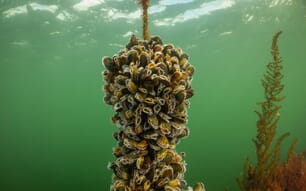At the closing of the 18th Special Meeting of ICCAT the 48 Contracting Parties decided to follow advice provided by the Scientific Committee and agree on annual fishing quotas of 13,500 t from 2013.
We encourage policy makers to continue to listen to science in the future. Only then will the East Atlantic and Mediterranean stock of Atlantic bluefin tuna have a chance to fully recover, said Dr Sergi Tudela, Head of Fisheries, WWF-Mediterranean.
WWF has a decade long involvement in the fight to avoid the collapse of this species. Collaboration with scientists, decision-makers and the fishing industry has resulted in turning what seemed to be an impending tide.
The bluefin tuna story illustrates how joint efforts to drive change can save even the most hopeless of fisheries from collapse,
The assessment of the East Atlantic and Mediterranean stock of bluefin tuna by the Scientific Committee prior to the ICCAT meeting detected, for the first time in the last decade, signs of a population increase.
Such results have obviously driven interests and requests for quota increase, added Dr Tudela.
Scientists however warned that the speed and extent of the detected recovery were unknown. They recommended a total catch within the range of 12,900 t to 13,500 t annually to ensure the stock could continue its recovery.
The 2012 meeting was a real test of the commitment of ICCAT members on the conservation of the bluefin tuna. We are pleased that respect for science has finally been imposed, with the EU at the forefront, in the fight against short term benefits by setting unsustainable fishing levels.
Oceana, an official observer at the meeting, also welcomed the steps taken for Eastern bluefin tuna management in 2013, but has grave concerns about the lack of new measures for threatened highly migratory species of sharks, and overall weak compliance with existing measures.
Maria Jos Cornax, Fisheries Campaign Manager for Oceana Europe, stated: The outcomes of this meeting reflect a baffling, contradictory approach within ICCAT. We welcome the willingness of ICCAT CPCs to stay on the path towards bluefin tuna recovery in 2013, but we are extremely concerned about the future of ICCATs forgotten species, Ms Cornax added: ICCAT is much more than bluefin tuna. ICCAT must remove its blinders and look beyond this one fish, to the many other stocks for which it is responsible.
ICCAT also did not sufficiently addressed the issues of illegal, unregulated and unreported fishing, said WWF.
We are frustrated about the apparent inability of the ICCAT to really ensure a real investigation of the reported allegations.
ICCAT examined cases submitted by WWF, which included well-documented irregular fishing and farming activities in Tunisia this year and large-scale unreported trade to Japan through Panama during the last ten years, yet no proactive decisions were made about these issues.
WWF will continue to deepen its efforts to expose environmental crime in this iconic fishery, Dr Tudela concluded
Further Reading
|
| - | Go to our previous news item on this story by clicking here. |



